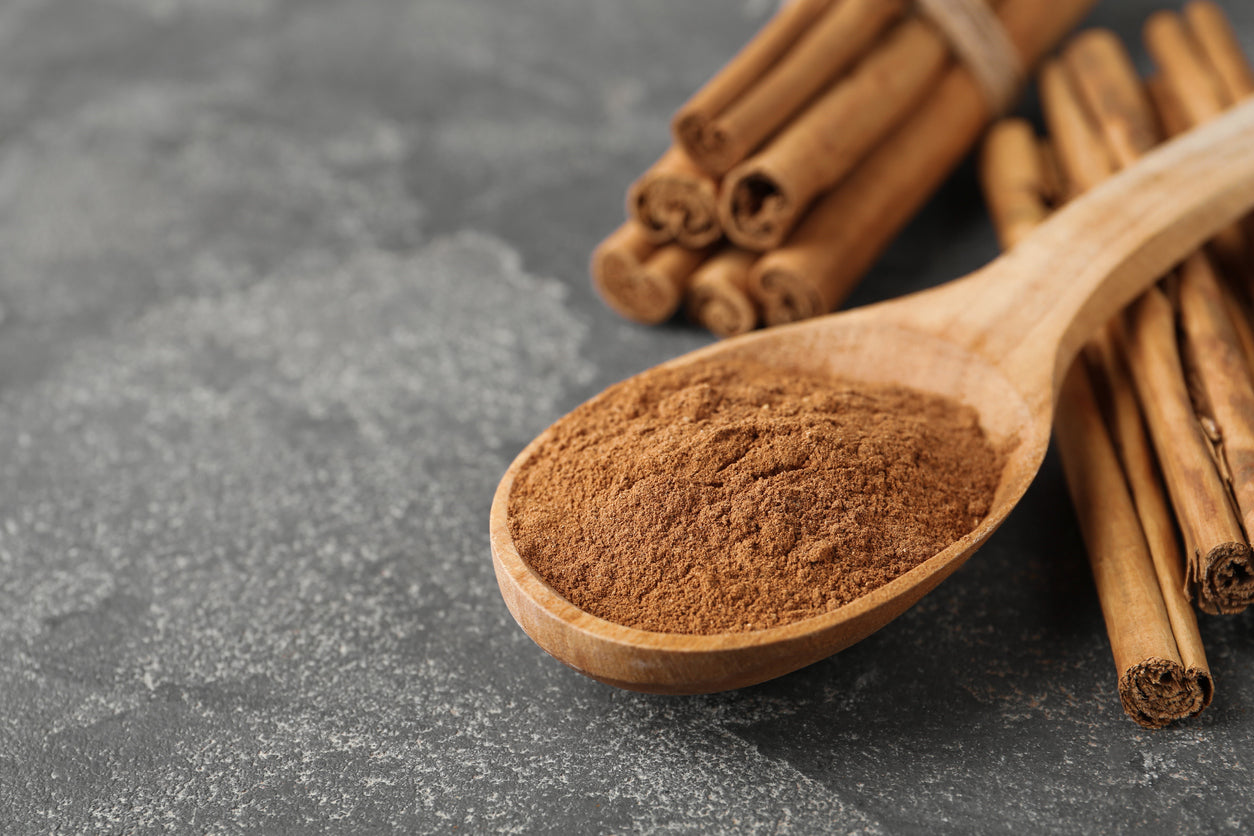“Rev up” your metabolism naturally with this one delicious spice

Cinnamon’s sweet spiciness lends a note of richness and elegance to pumpkin pie, sweet rolls, oatmeal cookies, baked apples, and more. Not only is it a trusty kitchen spice, but cinnamon is a time-honored herbal therapy, advised since antiquity by natural healers to treat a variety of ills, including respiratory conditions, diabetes, and digestive problems.
A new study suggests that a compound in cinnamon works on a cellular level to “tweak” the metabolism naturally - helping to negate some of the effects of eating high-fat foods and potentially promoting healthy weight. (Need we say more?!) So let’s take a closer look at cinnamon – and all the ways it can promote overall well-being.
Cinnamon uses multiple mechanisms to promote healthy weight
Cinnamon’s rich, elegant taste gives the impression of a “guilty pleasure” - an indulgent food high in calories and sugar. Yet this flavorful spice, at a tiny 6 calories per teaspoon, not only contributes few calories - but may actually promote weight loss.
Studies suggest that cinnamon can work against metabolic syndrome, a cluster of unhealthy conditions that include high blood sugar, high blood pressure, and excess abdominal fat. In a review published in the Journal of Diabetes Science and Technology, the authors reported that cinnamon could perform an amazing variety of health-promoting tasks - such as improving insulin resistance, regulating blood sugar, reducing fats in the blood, quenching inflammation, and even decreasing body fat!
But, the big news is a recent study published in Metabolism, in which scientists evaluated the effects of cinnamaldehyde, the volatile oil in cinnamon responsible for much of its effects. The team treated human adipose (fat) cells with cinnamaldehyde and found that it activated a metabolic response by increasing the expression of thermogenic (fat-burning) genes. The researchers noted that this phenomenon might explain the anti-obesity effects of cinnamon and support its potential benefits for humans.
Although merely consuming cinnamon is not a “golden ticket” for shedding excess pounds, it may help with a weight loss journey - particularly when combined with proper nutrition and regular exercise.
Cinnamon may regulate blood sugar
Cinnamon is rich in procyanidins - natural plant pigments with antioxidant effects - and inflammation-fighting flavonoids such as quercetin. Multiple studies have shown that cinnamon can scavenge harmful free radicals and reduce inflammatory markers such as C-reactive protein levels. And these qualities can help regulate blood sugar.
A controlled study published in Nutrition Research showed that cinnamon supplements worked better than placebo in lowering blood glucose in participants with type 2 diabetes. On an interesting side note, researchers remarked that Cassia cinnamon, the more readily available (and cheaper) form of cinnamon, was more effective than Ceylon (or “true) cinnamon.
As experts have reported, better blood sugar control goes hand-in-hand with weight control. Cinnamon also seems to improve insulin sensitivity in adults without type 2 diabetes, making it a beneficial seasoning for keeping healthy blood glucose levels.
Promote heart health with cinnamon
As if this weren’t enough to establish cinnamon’s “bona fides” as a superfood, it turns out that this versatile spice can enhance heart health. Some studies have shown that cinnamon reduces levels of undesirable LDL cholesterol and triglycerides (fats in the blood) while at the same time raising levels of beneficial HDL cholesterol (a neat trick, when you think about it).
While more research is needed, some animal studies have suggested that cinnamon can help maintain healthy blood pressure. So, it’s not surprising that cinnamon has been linked with a reduced risk of heart disease.
Spice up recipes with cinnamon
While cinnamon is a staple in many baked goods, it can also be used to elevate healthy snacks such as baked apples, fresh bananas, yogurt, and oatmeal. Spice up your morning coffee with a dash of cinnamon - or add it, with a bit of honey if you prefer, to baked squash or sweet potatoes.
For the ultimate cinnamon-y treat that offers up a jackpot of nutrients, simply coat almonds with a mixture of egg white and a little water beaten into a froth, then sprinkle with ground cinnamon and a little sugar and salt to taste. Bake in a single layer at 250 degrees for an hour until golden brown. These addictively delicious snacks offer antioxidant “punch” via their cinnamon and contribute immune system-boosting zinc; bone-building calcium, magnesium, and phosphorus; antioxidant vitamin E; healthy monounsaturated fats; and dietary fiber.
Cinnamon is generally recognized as safe when eaten in amounts found in food. If you make cinnamon a part of your daily diet, most experts recommend staying within two to four grams daily (one-half to one teaspoon). Check with your integrative doctor before taking cinnamon supplements.
Cinnamon is such a familiar and beloved ingredient that it’s easy to take its benefits for granted. But, the fact is: the benefits are very real. And a few sprinkles of cinnamon can make a great, antioxidant-rich addition to your healthy diet.
Sources for this article include:






